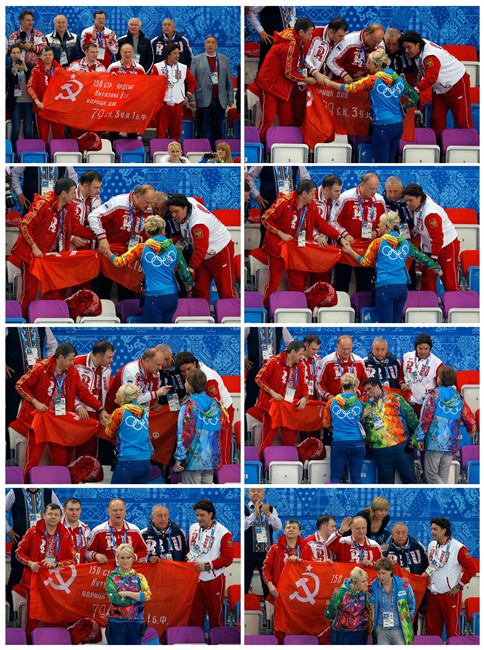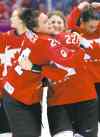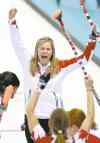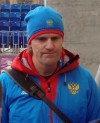Russia’s communist party head displays banner at Sochi Games, resists when asked to take down
Advertisement
Read this article for free:
or
Already have an account? Log in here »
To continue reading, please subscribe:
Monthly Digital Subscription
$1 per week for 24 weeks*
- Enjoy unlimited reading on winnipegfreepress.com
- Read the E-Edition, our digital replica newspaper
- Access News Break, our award-winning app
- Play interactive puzzles
*Billed as $4.00 plus GST every four weeks. After 24 weeks, price increases to the regular rate of $19.00 plus GST every four weeks. Offer available to new and qualified returning subscribers only. Cancel any time.
Monthly Digital Subscription
$4.75/week*
- Enjoy unlimited reading on winnipegfreepress.com
- Read the E-Edition, our digital replica newspaper
- Access News Break, our award-winning app
- Play interactive puzzles
*Billed as $19 plus GST every four weeks. Cancel any time.
To continue reading, please subscribe:
Add Winnipeg Free Press access to your Brandon Sun subscription for only
$1 for the first 4 weeks*
*$1 will be added to your next bill. After your 4 weeks access is complete your rate will increase by $0.00 a X percent off the regular rate.
Read unlimited articles for free today:
or
Already have an account? Log in here »
Hey there, time traveller!
This article was published 22/02/2014 (4243 days ago), so information in it may no longer be current.
SOCHI, Russia – The head of Russia’s Communist Party held up a hammer-and-sickle Soviet banner during a flower ceremony at the Winter Olympics, leading to a confrontation with staff over violating Olympic rules that bar political statements at the games.
A series of photographs taken Friday night shows Gennady Zyuganov in a group of five men in the stands displaying the historic Soviet Banner of Victory toward the podium while medals were being awarded in three short track speedskating events at the Iceberg Skating Palace.
The banner was a replica of the flag raised by Soviet soldiers in Berlin in 1945, in victory over Nazi Germany. It is a symbol of victory in World War II under communist leadership, bearing the name of the unit that raised it.

It’s not clear how many political displays have been attempted inside venues during the Sochi Games. But few if any have been noticed.
“It happens all the time,” International Olympic Committee spokesman Anthony Edgar said Saturday when shown the photographs. He said the IOC would look at the situation no differently than other displays that aren’t allowed, like athletes wearing arm bands to honour dead loved ones. The symbol of communism, he said, is no more or less offensive than other displays.
Sochi organizers said they considered the matter closed and planned no further investigation because the men took down the banner when asked. They declined an interview with The Associated Press.
“Yes, the IOC rules probably ban party symbols, but this is not a party symbol — it’s a victory flag,” said Zyuganov spokesman Alexander Yushchenko, who was also involved in the incident. Yushchenko said he’s unfurled the same banner at previous Olympics and held it during the opening ceremony earlier this month without any problems.
The men, including Russian lawmakers Nikolai Kharitonov and Yuri Afonin, held the banner for about 10 minutes before a brief confrontation with arena staffers. It ended with the staffers standing in front of the banner to block its display and the venue manager, Russian speedskating gold medallist Svetlana Bazhanova, intervening and asking again that the banner be taken down.
“They weren’t supposed to do that,” Sochi 2014 spokeswoman Aleksandra Kosterina said of the men displaying the banner.
Rule 50.3 of the Olympic Charter prohibits “display of any sign, banner, poster, piece of equipment or clothing which could be perceived as any kind of demonstration or propaganda,” according to official guidelines provided to national organizing committees.
The confrontation started with one venue staffer asking the group to take down the banner. The photos show the staffer grabbing the flag, then Zyuganov and three other men grabbing her by both her wrists to keep her from taking it down. Zyuganov then pointed his right index finger at a second staffer, the arena’s deputy venue manager, when he approached the group.
The confrontation was broken up by Mikhail Kusnirovich, the founder and chairman of Bosco Di Ciliegi, the official clothing manufacturer of the Olympics. The photos show Kusnirovich speaking with the staffers, then the staffers backing off the confrontation and the original staffer standing in front of the flag with her arms crossed. Zyuganov waves to the crowd as Bazhanova arrives and asks that the banner be taken down, while the two staffers stand in front of the banner with their arms behind their back.
The Communist Party was the ruling party during the years of the Soviet Union, from the time Bolsheviks led a revolution in 1917. Its leaders included Vladimir Lenin, Joseph Stalin and Mikhail Gorbachev before the end of the Soviet Union in 1991.
In the past decade, the Communist Party routinely was the second most popular party in parliamentary elections, far less powerful than the ruling United Russia Party, the party of Russian President Vladimir Putin. The Communist Party has 92 of 449 lawmakers after garnering 19 per cent of the vote during the last parliamentary election in 2011.
___
Associated Press writer Nataliya Vasilyeva and AP photographer Vadim Ghirda contributed to this report. Oskar Garcia can be reached on Twitter at http://twitter.com/oskargarcia









